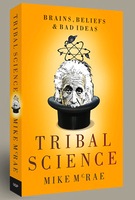Normally I hate blog-to-blog discussions. I much prefer them to be kept to comment threads. However, given the length of my response and technical difficulties posting, I figure I’d simply post it here.
For a bit of backstory, the sequence of relevant blog posts can be found at Greg Laden’s Blog, my own response, and Stephanie Zvan’s ‘Almost Diamonds’ blog. There are two issues here – one is the role of multiple strategies in atheist outreach, the other being the definition and representation of subcultures within the community (namely those who believe more in accommodating diverse views/evaluating communication styles, and the others who strongly advocate the use of confrontation and ridicule).
My response is to Stephanie’s post:
I appreciate the attempt to challenge criticisms levelled against so-called confrontational New Atheists. For the most part, if I read between the lines, I think we might even agree more than disagree.
There seems to be a lot of assumptions about what ‘the other’ is saying with regards to the ‘New Atheist’ vs. ‘Accommodationist’ debate, however, leading to straw man attacks and blind assertions. I won’t exclude myself from this, as much as I find it frustrating. For example, I’ve lost count on how often I’ve been accused of claiming confrontational language, ridicule or ‘snark’ should never be used. I’ve only ever said that for any of its benefits, there’s a good chance it produces consequences which may (depending on your goal, and that of others) be undesirable, especially regarding language which attempts to demean or create emotional anxiety in a target.
If your challenges were created with me personally in mind, I can’t see how you’ve avoided misrepresentations of my position. If I take them as directed non-specifically at any atheist, they’re worth considering.
Challenge 1:Decide whether this is important to you.
Is confrontation as a tactic among atheists an issue you think needs to be addressed? Will it really change the world if you can get a few people to follow your advice? Or are you annoyed by some people who have stomped on your feelings on the blogosphere?
These aren’t frivolous questions. You’ve got work to do. They’ve got work to do. And change, as you already know, is hard. You should also know that if you do this wrong, you’re going to entrench the bad blood over this issue even further. Every little thing you (and everyone else with any kind of platform) say on the topic goes on record these days. If you don’t care enough to do this right, maybe it’s time to shut up about it, at least in public.
For me personally, this isn’t a simple matter of avoiding the risk of feelings being hurt, but a question of a community of people who pride themselves on their rational thinking being open to critically discussing tactics and methods and presenting evidence for why they believe they’ve succeeded, or at least articulating their goals.
Does confrontation need to be addressed? I think it needs to be understood objectively in context. If a person is going to justify using it, and values reason over emotion as a reason for action, they’ll need more than ad hoc reasoning, and go beyond a sense of wanting to punish people they don’t like.
I think criticisms should be met with something more reasonable than indignant hostility, which seems to be an all too common response.
Challenge 2: Know your audience.
Who are you trying to reach? Are you talking to published “New Atheist” authors? Are you talking to atheist groups that sponsor ad campaigns or social meetups? Are you talking to groups that lobby and pursue legal action? Are you talking to blog commenters? Are you talking to forum campers? Are you talking to unaffiliated atheists who just want religion to leave them alone?
These types of groups have very different goals. They have different tactics. They have different degrees of centrality and authority. They have different religious backgrounds and degrees of education. You have to take the time to understand them–ask them real questions and listen to the answers–if you want to know what language to speak and what problems you’re going to offer to help them solve.
You also have to understand that you frequently can’t address multiple groups using the same message. They’re just too different. Being an atheist only gives you so much in common with other atheists. At the same time, however, any individual atheist may belong to many of these groups. You’re never going to have the luxury of addressing just one set of concerns at a time, and you’re going to have to go to extraordinary lengths to keep from generalizing between groups based on the cross-group memberships of certain individuals.
A good criticism, and one I should well take on board. I admit my earlier post was a shout into the ether (as most blogs are) more than a well targeted response – my audience was at atheists in general, which in hindsight is a rather broad demographic.
To be honest, however, it is a goal I struggle to define clearly, should I want to specifically target confrontational NA. Where atheists are adamant that snark, criticism and confrontation are useful in changing minds and attracting attention, how does it stand that it shouldn’t be used against them? Once again, I reiterate that I don’t think snark is useless (even if it is a polarising device). I object more to intentionally demeaning or offending a target, which I have never intended to do.
By the same token, by my own admission it is a polarising force – one that makes non-confrontationalists (ironically) feel supported but irritates those who disagree. In fact, with few exceptions, I’ve personally found many of those who justify ridicule and confrontation are difficult to engage in rational discussion on the topic, deferring to childish ‘because they started it’ retorts.
So, how to progress from here? Obviously communication is always a work in progress. In response to your challenge point, I can only personally say I’m also still learning how to best engage in discussion.
Challenge 3: Learn to see privilege.
Being an atheist won’t get you killed very often. In many environments, being an atheist is entirely invisible. In some, it’s perfectly respectable. That does not put atheists on par with the religious. Unless you understand where the differences are, you will never be able to effectively address the concerns of atheists.
Read a privilege checklist or two. Understand what it means to have an area of your life that you choose to keep hidden because there are consequences of doing otherwise. Understand what it means to be watched for signs that you represent a degenerate type. Understand how much time and energy it takes to answer questions whenever you identify yourself. Understand how much it takes to run constant calculations on whether to go with the flow or upset the social order. Understand what it means to watch people take the time to decide whether they really knew you at all when you come out. Understand what it means to hear political debates on whether you’re ruining modern life.
Only once you get all that can you actually understand what you’re asking otherwise.
I admit, I am totally lost on what this has to do with the discussion at hand. I understand the notion of privilege and the role of religion as an oppressing force. I understand the resentment, the sense of injustice, and the decisions people are forced to make. Asking people to consider whether their confrontation is more about their anger than a real attempt to change the behaviours of others is not to be unsympathetic to their emotions – it’s to be critical of their application of them.
If you feel that the only way to address privilege is to ridicule it and demean those who hold it, I’d need to see evidence of it beyond assertions, as I disagree.
Challenge 4: Recognize the limits of your own expertise.
There is a fair body of cognitive science having to do with communication. It doesn’t begin to approach the complexity of real-world (meatspace and electronic) communications. There is a lot of information to be had from these studies, but this is a very new science, given the size of the topic. It can only tell us so much.
One of the things it can and has told us is that the power, privilege and out-group status of the speaker have an effect on how the speaker’s message is received. We know that whether we are trusted or even heard as speakers is often largely out of our hands. What we don’t know, what cognitive science, or at least those presenting the cognitive science, has yet to tell us despite our very real need for the information, is how to overcome this problem.
Until that happens, asking people to understand the cognitive science is reasonable. Asking people to replace current behavior is not. Confrontational tactics for minority groups may not be supported in the cognitive science literature, but neither are they shown to be worse than any other tactics for minority groups. In the presence of privilege, we simply don’t expect any communication tactic to have a high rate of success. (Legal tactics, on the other hand….)
Meanwhile, there are other disciplines that do suggest the confrontational approach has merit. The history of social movements is plastered with groups taking approaches that make people feel uncomfortable and threatened. It is also plastered with groups succeeding with approaches that make people feel uncomfortable and threatened. And frankly, familiarity with this sort of social history shows just how mild “confrontational” atheists of the current sort are by comparison.
Even if you aren’t concerned with social change directly, recognize that attacking the privilege problem directly is a communication tactic with the potential to succeed. Privilege gets in the way of effective communication. We can go around this with the appropriate tools when cognitive science gives them to us. Until then, we can do our best to go through.
This is another straw man, that cognitive science has all the answers. It doesn’t. It presents a starting place for discussion. It offers some insight into human thinking, as you’ve conceded. There are aspects which are applicable, and some which might not be. Determining which takes more than a blanket dismissal or a claim that it is all ridiculous.
I couldn’t disagree more with your claim in that how a message is received is ‘largely out of your hands’. Interestingly, this evening I was at a sci-com lecture held by somebody studying the emotional responses of audiences to instances of outreach, regarding science rather than atheism. There are no certainties, but some methods are definitely better than others in communicating within diverse contexts. If you think as a communicator you can’t sway your audience, I wonder why you’d bother even trying. I do admit, however, that I might have misunderstood your position here, so please feel free to clarify it.
Speaking personally, I don’t think I have ever told people what to do or not to do in a generalised suggestion, other than to objectively consider all the consequences of their communication, and to think critically about it. I have pointed out where I feel communication might cause undesired results, asking for clear expression of goals.
Challenge 5: Recognize others’ work and expertise.
This is the point where I tell you to drop the word “but” from your vocabulary. Atheists, even highly annoying ones (whichever set that may be for you), have made major accomplishments in the past couple of decades. Best-selling books, wide blog readerships, social mobilization for political action, communities that support out atheists and those who have left religious communities, successful events at the regional to international level, cogent social criticism, historical scholarship, increased visibility of abuses of power despite a hobbled press.
Is there crap being produced as well? Of course. Sturgeon’s Law. That doesn’t make the accomplishments I just mentioned any less real.
It also doesn’t exempt anyone from the requirement to deal with the accomplished as, at the very least, people with as much to teach as you believe they have to learn. The lessons they have to teach may well include the fact that what they do is so more difficult than it appears on the surface–requiring extraordinary timing, wordsmithery, and humor–that most people may as well not try. You’ll never learn it if your approach is to say, “Yeah, they wrote a best-selling book, but it’s only because….”
Have atheists produced communities of like-minded individuals? Definitely. I can’t say this is a bad thing. For many individuals, this might be their only goal, in which case the evidence of success is clear. If PZ Myers only ever wanted to set out to make snarky atheists feel at home in mocking stupid religious people, I can only say he’s done well.
Beyond that? We’d need to discuss the evidence.
In any case, there is often a difference between output (numbers of people you reach) and outcomes (achievement of a goal). Many rationalists make the mistake of conflating them.
Lastly, being successful in any field should not put anybody beyond criticism. I have no doubt that Dawkins is a successful writer. That’s obvious. I couldn’t say for certain what his goals are, however, as much as I could speculate.
There is also evidence of atheists coming out of the closet as a result of reading his stuff. Great. But does that mean other consequences of his writing, either specifically or in general, are beyond discussion and criticism?
Being able to point out potential flaws in a particular effort should not be a privileged position. If you don’t like being criticised (especially when criticism of others is your main discourse), maybe speaking up is a bad thing.
Challenge 6: Offer something better.
The problem of addressing religious privilege while simultaneously working around the bald fact that the religious hold most of the political power is tough. It’s ugly. Nobody who is trying to do both thinks it’s simple. Your final challenge is to deal with the real difficulty of that problem.
However, the people who are tackling that work aren’t going to be lured by a message that is, in essence, “Ignore the privilege problem in order to solve problems that require political power.” Privilege is power. Your audience knows that solving individual political problems while allowing the privilege to persist is fighting a hydra. Offering a sharper sword only makes the heads multiply faster.
However, offer the equivalent of a torch, and you’ve got something. If you want to shape how atheists communicate, figure out how to offer them something that undermines religious privilege at the same time.
No, I don’t know what that is either. All I know is that if you offer something short of that, you’re offering less than what atheists ultimately want and need, and that won’t work. That’s why you need to decide up front how important this is to you. That’s why it’s a challenge.
I feel the only way ‘something better’ will be achieved is when critical discussion is seen as a virtue that strengthens communication rather than compromises a sense of community. This means meeting criticisms with reasonable claims, discussing evidence objectively, putting effort into evaluation, and proposing changes.
Could I do any of this better myself? Hell yes. But that doesn’t mean it’s a worthless goal.
(Edited to include quotes for challenges)
 At first thought, Amy Winehouse and Anders Behring Breivik have very little in common, other than having their names dominate headlines as front page news for a period in late July 2011. Yet for both of these individuals, the question of mental illness and culpability are significant in the public discussion on their recent actions.
At first thought, Amy Winehouse and Anders Behring Breivik have very little in common, other than having their names dominate headlines as front page news for a period in late July 2011. Yet for both of these individuals, the question of mental illness and culpability are significant in the public discussion on their recent actions.
